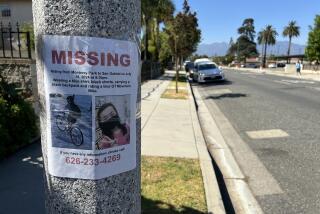Finder of the Lost Is Missing : Probe: Santa Clarita woman lectured on vanished children and ran firm to find them. Now she has disappeared amid check charges.
In the suburban outposts of the Santa Clarita Valley, where oak trees and tanning salons dot the landscape in increasingly equal measures, June Littlefield became known as a champion of missing children.
A striking woman with piercing blue eyes, Littlefield captivated audiences at groups such as the Santa Clarita Valley Health Council and local chapters of the National Council on Alcoholism and the Optimist Club. The self-proclaimed founder of Missing Persons International Inc. impressed audiences with impassioned presentations peppered with chilling statistics about missing children, striking a responsive chord in a community known for young families.
One family therapist recalled that for weeks after hearing one of Littlefield’s lectures on kidnaping, “when my daughter would be in a shopping cart and when I turned around to get something off a shelf, I had my hand on her all the time because of what (Littlefield) said.”
Today, the missing persons maven is missing herself, an apparent fugitive from the law and her own crumbling credibility.
Littlefield, 55, was supposed to appear in San Fernando Superior Court on May 29 for a trial on charges that she stole about $6,300 from a former employer by forging or altering checks. Although she vehemently denied the charges and helped prepare a complicated legal defense, Littlefield never showed up for her trial.
An arrest warrant has been issued, and she is the subject of an investigation by the Los Angeles County Sheriff’s Department’s fugitives unit.
Littlefield left no forwarding address when she, husband Chuck Littlefield and her 20-year-old son from a previous marriage abandoned their home at the Sierra Pelona Motel on Sierra Highway in Saugus.
What Littlefield did leave behind was a trail of debts, soured relationships, disappointment and questions about her group’s legitimacy, according to interviews and court records.
In its brochures, Missing Persons International offered to trace runaways, adopted children, POWs and MIAs. Dr. June Ramsay--as Littlefield called herself--claimed expertise in fields ranging from taxidermy to rape counseling to genealogy. Littlefield also was formerly known as June Miller, from a previous marriage.
It is unclear what the group promised its clients or how many clients it had. Also unclear is the amount of money the group raised and how it was spent. Missing Persons’ address was a post office box and Littlefield accepted free office space and equipment from various supporters.
Tamara Thomas, a Santa Clarita businesswoman who gave Littlefield free desk space in her office and inherited her files, called the missing woman “a total and complete humanitarian” who left town because she was mortified by the legal charges against her and the publicity that followed.
Thomas, who said she had planned to become a partner in the organization with Littlefield, said she does not know where Littlefield has gone.
According to Thomas, Littlefield’s expertise in tracing missing people began 30 years ago when she searched for a daughter she had given up for adoption at birth. Littlefield eventually found her daughter, then started shepherding others through the legal maze, Thomas said. “There was never a time when she didn’t have 10 or 12 investigators working for her.”
But when asked to provide names of investigators and of clients whose relatives Littlefield had found, Thomas cited confidentiality and said, “I’m not allowed to do that.”
Missing Persons International claimed in pamphlets to command a “worldwide network” of contacts and have a phone and fax number in Saudi Arabia as well as a Canyon Country post office box. But sheriff’s deputies who specialize in finding missing people said they had never heard of the group or of Littlefield until her legal problems began last fall.
Sgt. Galen Sabean, who supervises the Sheriff’s Department’s missing children’s bureau, recalled that Littlefield phoned him a couple of years ago “to use my name and the department’s for a little bit of credibility.” But he said he became skeptical when he could not reach Littlefield by phone.
Several short-term volunteers, who stuffed envelopes and hoped to become investigators, said they were similarly disillusioned by Littlefield’s failure to return phone calls, keep appointments and organize activities, along with what some saw as her eccentricity.
An accountant and his wife who briefly joined Missing Persons International recalled that Littlefield toted around a box of used Kleenex and told people that each wadded up tissue represented a missing child she had shed tears over.
“I thought that was kind of weird, to tell you the truth,” said the accountant, who spoke on condition of anonymity.
The accountant said he had responded to an ad Littlefield ran in a local newspaper seeking investigators and offering them $15 an hour. Littlefield urged her investigators-in-training to use false names for their own protection, the accountant said, and to tell clients that a fee would be welcome but not necessary.
Diane Barbee, a neighbor of Littlefield’s at the Sierra Pelona Motel, said she sought Littlefield’s help in making sure that the daughter she gave up for adoption 23 years ago could learn who her mother was, if she wanted to.
“She had me fill out papers and she had a computer and everything,” Barbee recalled. “I thought she was a wonderful person.”
But Barbee said she asked Littlefield twice over several months if she had heard anything about her daughter, and Littlefield’s response both times was that she had been busy. When Littlefield left the motel in February, “June said when they get settled, she’ll have more time to do something about my daughter,” Barbee said. She said she has not heard from Littlefield.
Missing Persons was never registered as a tax-exempt, nonprofit group, prompting a short-lived investigation by the state attorney general’s office last year after Littlefield began soliciting donations.
State investigators accepted Littlefield’s claim that the lack of registration was an oversight, and they decided that the group’s fund-raising efforts were too meager to warrant further attention, said Deputy Atty. Gen. James Cordi.
Littlefield got less sympathy from Deputy Dist. Atty. Sandra L. Seinfeld, a Santa Clarita-based prosecutor who says checks entered into evidence leave little doubt that they were altered so that Littlefield could steal about $6,300 from her former employer, a small painting contractor whose office she managed.
The contractor, Michael Fink, said he discovered the discrepancies in his financial records after Littlefield left the job suddenly and without explanation, leaving a note saying, “Don’t ever contact me or else I’m going to destroy you.”
Littlefield claimed that Fink sought charges against her because she threatened to expose his illegal business practices.
Fink, who obtained a restraining order against Littlefield, according to court records, dismissed the accusation as “a bunch of baloney.”
Littlefield’s former attorney, G. Marshall Hann, said he believed Littlefield was innocent in the Fink case.
Yet even Hann said he and Littlefield parted on bad terms. He declined to discuss details, citing a fear of harassment and adding:
“She’s made a lot of threatening overtures against me and everyone else she feels has wronged her.”
More to Read
Sign up for Essential California
The most important California stories and recommendations in your inbox every morning.
You may occasionally receive promotional content from the Los Angeles Times.










